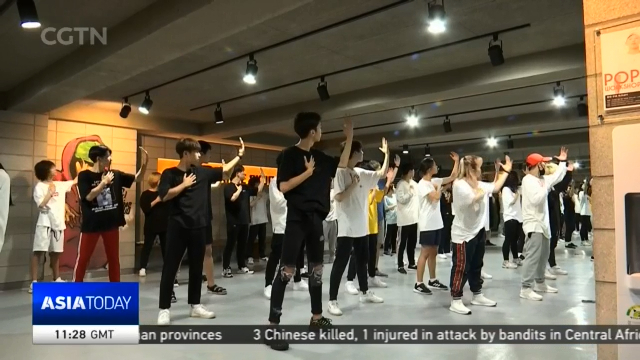
19:55, 06-Oct-2018
Idol-Making Industry: Highly competitive system draws controversy
Updated
19:06, 09-Oct-2018
04:41

The international popularity of "Produce 101" has helped South Korea export not just the show but also the K-pop "idol system". And as Joseph Kim reports, the highly competitive industry has drawn both fans and controversy.
Before performing in sold out stadiums or having any hit songs, Do-yeon and Yoo-jung were here. Practicing, for their dreams to become a star.
KIM DO-YEON, MEMBER WEKI MEKI "About 12 hours a day, we trained, from 10 in the morning to 10 at night."
YOO-JUNG, MEMBER WEKI MEKI "It was so hard to endure because I was constantly in the basement practice room, practicing, so I had doubts like 'Can I make my debut?' It left me so uncertain."
Yoo-jung tells me she was in 6th grade when she became a trainee. For years, she and Do-yeon tirelessly practiced until they got their lucky break. Now, they're part of the girl group Weki Meki and spokesmodels for fashion brands.
KIM DO-YEON, MEMBER WEKI MEKI "When I was a trainee, I only dreamed of doing these photoshoots. I never thought I'd be here. I used to practice poses in front of my bathroom mirror by myself."
They are K-pop celebrities thanks to the music survival program, Produce 101. The competition show captured the daily struggles trainees like Yoo-jung and Do-yeon have to go through every day. And according to music executives, this rare inside look is what captivated audiences.
BERNIE CHO, CEO DFSB COLLECTIVE "When you see the selection process, the training process, it's hard. It makes for great television because it's got drama, it's reality, it's like watching 'The Hunger Games'."
Exposing the idol system may have made for great television but it also further normalized and even celebrated the hyper-competitive system most minors have to endure in South Korea.
JOSEPH KIM SEOUL "These kids are lined up for an audition. If they're picked, they'll get the opportunity to receive training to possibly becoming a singer. And the process is vigorous and realistically not everyone can become a star but as K-pop is now global and actors and singers are now touted as the golden standard for success stories, all the industry shortcomings have become justified while society has been blinded by the glamor of it all."
WOO EUN-YOUNG, CEO DEF COMPANY "In South Korea, it's everywhere. As soon as you turn on the TV, idols come out, singing and dancing on every program. So it's natural young children see this and want it to become their job. They think, 'I want to be up on that stage, singing and dancing'."
While conditions for trainees and young stars under the idol system have improved over the years, the problem is they're still largely unprotected, despite being minors.
Many still liken it to a factory-like system, where kids are treated as mere commodities with no room for failure.
I've spoken with label execs, academics and even government officials about the lack of a safety net for these young people but most of them told me it's all warranted, calling it, education.
LEE GYU-TAG, PROFESSOR GEORGE MASON UNIVERSITY KOREA "When experts and professors talk about the areas in which K-pop needs to improve, many talk about the need to change Korea's educational system. Although it seems like the K-pop industry and Korea's educational system are not related, they are. The reason the idol system exists and is accepted without seeming out of place is because that these kids who are preparing to become stars and train until 9 PM, 11 PM, midnight, and then take audition tests once a month, is because at that age, other kids their age are living the same lifestyle. So people don't think it's cruel. These kids train to go on stage and other kids study to go to college."
South Korea's high-pressure education system has led the country to have the highest rates of teen suicides among advanced economies.
The country is also just behind Mexico for the longest working hours in the OECD, and this overwork culture is reflected even in young K-pop idols who are often overworked to exhaustion.
Despite calls for a conscious effort to improve laws to protect these minors, South Korea continues to ride on the popularity of K-pop, exporting its music and shows like Produce 101. And along with it, the country is exporting this model and providing justifications for child labor.

SITEMAP
Copyright © 2018 CGTN. Beijing ICP prepared NO.16065310-3
Copyright © 2018 CGTN. Beijing ICP prepared NO.16065310-3